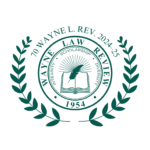Criminal Procedure
During this Survey period, the U.S. Supreme Court, Michigan Supreme Court and the Michigan Court of Appeals decided cases that will have a significant impact on Michigan criminal procedure jurisprudence. The decisions run the gamut from the scope of a search of an automobile following a lawful arrest; application of the good-faith exception to the exclusionary rule; post-arrest, post-Miranda interrogation issues; joinder of offenses; right-to-counsel claims; as well as several significant sentencing decisions. Read More …
